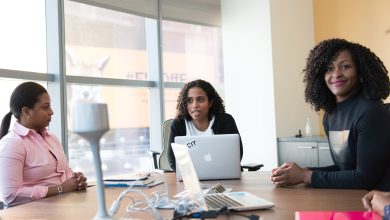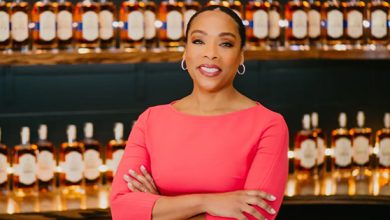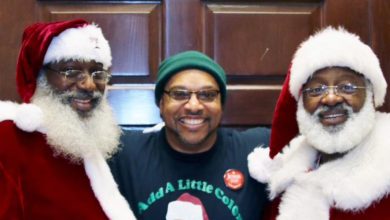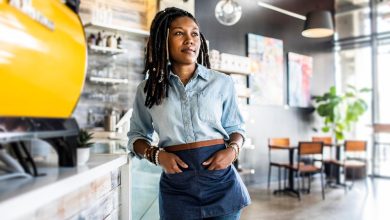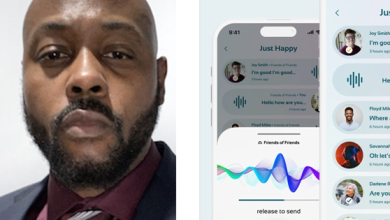Black Students in Business — A mission of empowerment, leadership and innovation | Audio
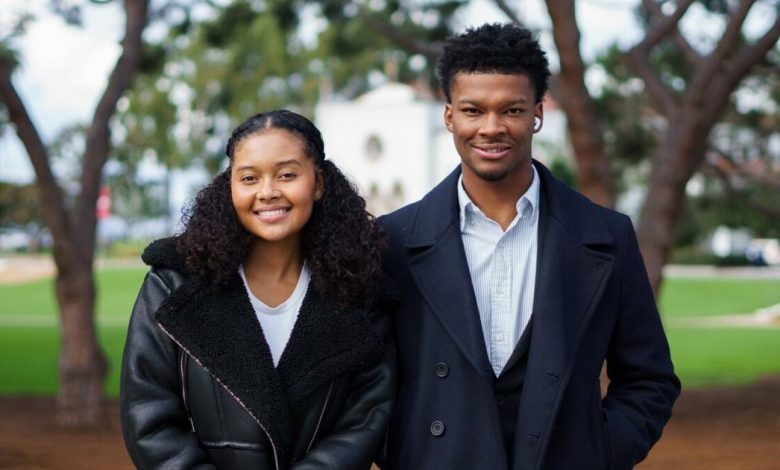

Khamalia Williams (K.W.): Black Students in Business (BSB) is a registered student organization originally founded in 1998 by Glenn Milus (’98), an accounting major. In 2024, the organization was reestablished by Amina Lamar, marketing major, Tre Williams, business management and leadership major and others. Since then, BSB has worked towards providing academic and career resources, networking opportunities and fostering a community for Black students pursuing fields in business. In this episode, I spoke with co-presidents of BSB, Amina and Tre to discuss. My name is Khamalia Williams, and it is my opinion that Black Students in Business has done a fabulous job in creating a safe space for Black students pursuing careers in business to be uplifted, nurtured and given opportunities that will create a more diverse business field in the near future.
Hi Amina, hi Tre, how are you guys today?
Amina Lamar (A.L.): Hi.
Tre Williams (T.W.): Hi, how you doing?
K.W.: I’m good thank you for asking. So, can you explain to me what Black students in Business is?
A.L.: Black Students in Business is an organization that promotes experience in the career field of the business industry, any profession within the business industry, but it’s supposed to facilitate a welcoming and nurturing environment that can help proceed and give you the resources in order to fulfill your career aspirations.
T.L.: We actually do host a multitude of different types of events ranging from networking events to guest speaker series and even community service so, we have a lot of different facets to it as well.
K.W.: So, I’m aware that both of you guys, Amina and Tre, you guys worked towards reestablishing Black Students in Business last year. Can you talk to me a little bit about that process?
A.L.: Yes. So, it started out as us in Mr. Mason’s [Charles Mason, associate director of transfer admission] room talking about how we can implicate and make a mark on campus. What is something that we both found passionate about and something that we have natural interest in? So, we found that we’re both business majors and that we’re both Black … so we wanted to find a space that fits for us, that we can include that also helps towards our career. So, we found that Black Students in Business was already established in 1998 by Glenn Milus, who was a student here who’s an alumni as an accounting major. So, he told us about how he had his past of what he has done in Black Students in Business. So, Mr. Mason advised us to reestablish it to help facilitate and grow the community that was once there before.
T.L.: We ultimately reestablished it so that we would see more powerful Black people and let obviously the Black community at LMU see that for themselves.
K.W.: That’s interesting because in the business field we obviously know that Black people are underrepresented, so you guys are helping to overcome that with this mission, with [these] networking opportunities for Black students. That’s amazing.
A.L.: Exactly.
K.W.: So, since the reestablishment, how has BSB fostered a safe space for Black students interested in business on campus?
A.L.: BSB has facilitated a safe space by creating a community, by creating a sense of a mission and as well as embodying that through our events, by having email threads or by having check-ins, by having study jams and things of that just for our BSB community, but as well as expanding upon our partnerships and our guest speakers helped us facilitate mentorships where we have our guest speakers exchange information, where students can reach out, send resumes, create a relationship with them so that they can get advising and tips that they can help in their career.
K.W.: So what is your experience as a Black student pursuing a career in business?
A.L.: I found as though that I’m one of very few in my business classes … I knew that that was something I was going to face. But I found that it was a demand for us Black students to come together because there isn’t a club before us that established for Black students specifically in the business field. So, knowing that there’s other Black organizations in their desired field and careers on campus I found that it was kind of a supply and a demand type of aspiration that wanted to be fulfilled and that needed to be fulfilled. So, I find as though having alumni that are African American that are in the business field, they’re not reached out to as much and used as a resource before this club. So, I found that in this organization that it was a niche or a desire to facilitate and establish that relationship with Black alumni that have a lot of relationships and correlation with our neighboring schools, such as [University of Southern California] USC or [University of California, Los Angeles] UCLA and their business schools. So, there’s a lot of interconnection and intersectionality within that. So, I found that very fascinating and something that we needed to have here on LMU campus. This past year 2025 I had the experience of being the director of marketing of an organization called D-Society which is to embody and embrace Black unity amongst UCLA, USC and LMU campuses here in [the] LA diaspora. So I found it a great opportunity to not only enlighten people that don’t know about Black Students in Business here at LMU, but educate and as well as create another community and relationship … that proceed onto networking and opportunities that could lead to internships or job relations that could propel you into your further career. So, I found that not only Black Students in Business, but D-Society has corroborated into enlightening the Black students here in college campuses amongst the LA region.
K.W.: Yeah, I heard of D-Society but I never knew what it was. Is it specifically for business or is it just a collaboration between USC, LMU and UCLA?

A.L.: Yeah so, D-Society was established at USC, and it is amongst all Black students in all career fields, so you can find your group and you can find your group of community within your field by going out to their events, networking with them and they also have professional events of Black professions in their desired career. So, you can find what best fits for you and what aligns with your interests.
K.W.: I might have to join that. I love organizations like that.
So, a recent statistic conducted by the Pew Research Center in 2022 found that only about 3% of firms in the U.S. are Black-owned, that’s insane. In terms of small businesses, it is estimated that there are 34.8 million small businesses in the U.S., with 3.6 million of them being Black-owned according to the U.S. Small Business Administration. Now that’s about, that’s around 10% or so, so not too bad. But what do you have to say about the firms thing? Because obviously firms should also be owned by Black people. So how can we improve this in the future?
A.L.: I think that is very important to show young students what it’s like to be a professional and what it means to be Black in those rooms. So that’s why I found it very important to bring on a lot of Black professions within the business such as B.B.A., which is Black Business Association, for adult professions whom we can look up to, we can connect to, to ask for those advice and those specific questions that kind of hit home for us, but it is important to show young students that it is possible. So, it’s very essential to create that narrative and to show that that aspiration could be attainable.
T.W.: Obviously people harp on this all the time but networking, your network is extremely important. And also, I think starting young doing things like Black Students in Business, [Brothers of Consciousness] B.O.C., other clubs around campus, not even just college but in high school as well. It’s extremely important because I think what ultimately separates minorities a lot of times, is not being able to have those connections in higher places. And so if you’re able to build your network at a young age then obviously more people will have more opportunity.
K.W.: Yeah, that’s interesting that you said that. One of the things that I always noticed in my community growing up, I grew up kind of in the Crenshaw district, and the schools that are in our neighborhoods are often underfunded, overcrowded or they don’t have as much access to resources such as Black Students in Business. Even though it’s a high school or middle school, they should still have stuff like that that leads those students into college, that gives them that exposure. Some of these kids may not have people talking to them about college. So, can you talk to me a little bit about that? Maybe you guys had a similar experience in your communities?
T.W.: Ultimately, if I’m being completely honest with you, I come from a stable household. I come from parents that are together and everything like that. I would see things throughout my community back in St. Louis, Missouri, whether it was through friends, family, where I would see most of those disparities and the thing that I really want to make a point to is that I think it’s extremely important to pay it back. So when you do graduate college and you go into your career, I think going back to your community basically the place that really made you who you are and paying it forward to those kids I think is extremely important and ultimately will make the difference in the future.
A.L.: I definitely agree. Growing up in LA, you see that very forefront in your face, as well as growing up a two-parent household, it was [embedded] in me to go to school, get my education and as well as go with a scholarship. So, my mom immersed me into programs that were navigated for students to go to college. However, they may not have been all Black, but they have definitely pushed me into getting into that mindset early on and I feel like that is a lot of good wisdom and treasury that maybe some schools and some students, they don’t have the privilege to. I’m also part of a program called Black College Success Initiative. I have the opportunity to have that support and having that program along beside me. But as well as giving back to them, when this past summer, I was an advisor, a peer leader for high school students that are going to college advising them about what it is to be a college student especially in this time. So, I definitely do think that that is very important. And as well as creating that opportunity here at LMU, what way that how Tre and I can give back to where we are right now.
K.W.: So, we’re talking about these disparities, we’re talking about the fact that Black people are underrepresented in the business field. So how has BSB worked towards overcoming this underrepresentation?
T.W.: Something that me and Amina definitely worked towards when we first started the club with Charles Mason was that we have to make sure that we’re out there. We have to make sure that people know our faces. We have to make sure that people know the team that we have. And so, I think me, Amina and our team did a great job of marketing because obviously marketing is imperative to actually growing your brand. So, I think that the marketing obviously has brought a lot of eyes to us especially … so now that where we’re at, I’m pretty happy with the bit of representation that we’ve actually gotten and actually the success of some of our events so far.
A.L.: We have a lot of team support. But not only that, we have advisors like [Patricia G.] Martínez, Ph.D., Mitch Hamilton, [Ph.D.], another our advisor Kandis [Jernigan]. We had a lot of advisor help just to get us afloat as well. But 2025 was one of our biggest years because of the reign from January to now December that we’ve hosted about 20-plus events. We had a great turnout. We have a lot of established relationships. And so not only that it showed that we can do this, but it only showed that, OK it’s possible. And that we had a team in the beginning which were our friends, we’re getting together “Hey, do you guys want to be a part of this?” And then as time has gone on we have really found our team and our unity and what kind of works for us and how we can best market or best get the word out there, whether through its partnerships, connections, relationships, from whoever it can range from, our family friends to our old bosses to our current internship bosses. So, it could range but that’s the beauty of it of having that underrepresentation and then pulling together all of our resources and creating something beautiful.
K.W.: Got it. So you guys have been doing a great job advertising, and that’s coming from someone I like to go to every single event I have been to probably 70-plus events and I counted that. So, I definitely have seen some of you guys’ events be advertised. So, can you talk to me about some of these signature events that BSB has hosted, specifically the Hit-Boy event? I want to hear about that.
T.W.: As Amina mentioned before we have a lot of advisors that help us a lot with some of these opportunities, one of them being Mitch Hamilton he’s at the top of [Applied Learning in Societal Transformation] A-LIST, and so he actually reached out to Hit-Boy. He asked us to co-sponsor that event. So that’s one event that we’re extremely proud of because we know the importance of Hit-Boy in the culture, of course, of hip-hop.
K.W.: And can you talk about who Hit-Boy is a little bit as well?
T.W.: Yeah, so Hit-Boy is one of the biggest producers out right now. He produced things for Kanye West, Jay Z just to name a few, Travis Scott as well. And so he’s a very well-known name inside the music industry and he’s very accomplished as well.
A.L.: Hit-Boy was one of our recent events as well. But we also ranged back to when we had Fear of God [CFO] Glenn Milus who established this organization back in 1998.
K.W.: Wow.
A.L.: He was one of our pillar events when he had a big turnout for that event in which he had not only spoken to us but he had allowed us to go to visit one of their factories for the headquarters of Fear of God. So we found that opportunity not only to be once in a lifetime, but something that we can cherish and all the tools that he gave us and skill sets and tips we can also apply to our current aspirations.
T.W.: Another one I would also like to bring up is we also had the largest McDonald’s franchisee operator in the nation come speak to our club and stuff. So, I think just having powerful people from all different industries inside of business is extremely important.
K.W.: That’s beautiful. So lastly, what can BSB members expect next? I know this semester is kind of wrapping up now, what can they expect next semester?
A.L.: So yes, next semester is our last year, but we do have our team facilitating of how they’re going to ongoing enroll new people, new ideas, new events. But 2026 is going to be I think our biggest year. I’m going to put it out there, because we want to make a stamp. We want to leave an impact. We want to make some type of legacy for BSB and then leave something that could be passed on. 2026 is something that we’re looking forward to. It’s a bittersweet moment, but I’m excited.
T.W.: I am as well and ultimately, look out for that community service, more networking events, everything that I mentioned before, just on a larger scale this time. So, we’re really looking forward to doing a lot in 2026.
K.W.: Wow, great. Well, thank you for being here with me today guys. I really appreciated that conversation and I love, love, love seeing all the different Black organizations on campus, so got to talk to another one.
T.W.: Absolutely. Thank you for the opportunity.
A.L.: Thank you for having us.
K.W.: As previously stated it is my opinion that the Black Students in Business organization has done an amazing job of assuring that Black students feel seen, heard and represented in the field of business. Through their networking opportunities such as hosting a keynote speech with American record producer and rapper Hit-Boy, to inviting in the founder of BSB, Glenn Milus to discuss his career at Fear of God, Black Students in Business is assuring that Black students gain key insights in business administration. Through this, it is evident that their mission of resilience, leadership and innovation is being achieved.
This is the opinion of Khamalia Williams, a communications major from Los Angeles, California. Opinions and ideas expressed in this podcast are those of individual student content creators and are not those of Loyola Marymount University, its board of trustees or its student body. This episode was produced and edited by Khamalia Williams, audio commentator. Feedback about this episode can be submitted to editor@theloyolan.com Thanks for listening, see you next time.
